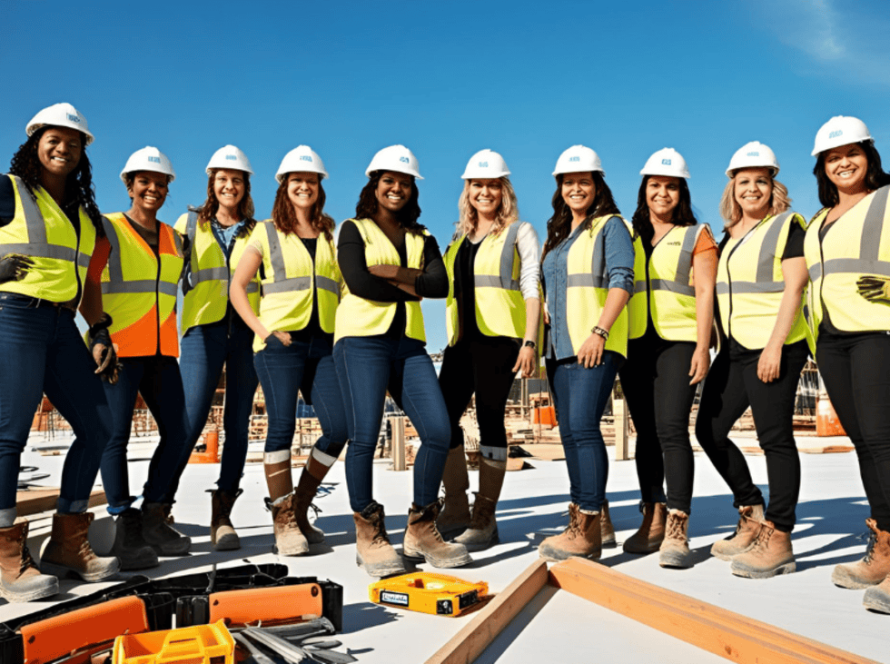Careers in construction are diverse, offering opportunities to work using different skills across a broad range of projects.
Career paths in construction can, therefore, go off in various directions, depending on what type of training the individual chooses to take, to build up their experience and develop their skills.
Some of the major job roles in construction:
- Vehicle Banksman
This is a crucial on-site role, because the vehicle banksman is in charge of guiding vehicle drivers around a site. The banksman must have a clear understanding of issues to do with manoeuvring and reversing vehicles.
- Bricklayer
If you’re a bricklayer, you’ll be working with various types of bricks, blocks and mortar, to create and fix different structures on a range of projects, varying in size and scope. These can be anything from constructing walls to working on commercial buildings and new building developments.
- Carpenter
A carpenter works with wood, creating essential elements for use in construction, including floorboards, walls and roofing. This is a constantly in-demand role in construction, and therefore a popular one. Carpentry requires a good understanding of technical drawings, and different types of wood.
- Joiner
Also working with wood, the joiner’s role is one of a craftsman, focused on creating interior elements of a building. These include windows, doors, staircases and a wide range of furniture. In fact, the joiner category is quite broad, as it includes wood machinists, CNC, CAD or CAM operators, joinery estimators and foremen.
- Plant Operator
The plant operator drives heavy machinery on a construction site. Plant machinery performs various functions, including lifting, manoeuvring and digging. Typically, each type of vehicle will require specialist training for its operator. These vehicles include excavators, cranes, dumpers and forklifts.
- Plant Mechanic
The plant mechanic maintains all the plant machinery on site. This is an essential role, because so much construction work is dependent on plant machinery.
- Plasterer
The plasterer’s job involves applying solid or fibrous plaster to walls, preparing them for decoration. Most construction projects will involve plastering.
- Scaffolder
The scaffolder puts up and removes temporary metal structures on construction sites. This enables other workers to carry out their tasks safely and conveniently at height. Scaffolders can work on the outside of buildings but also inside, where buildings are being renovated, repaired or decorated.
- Slinger Signaller
Similar to the vehicle banksman (see above) the slinger signaller has a vital role in guiding other operators. Essentially, the slinger signaller acts as the eyes and ears of the crane operator, who will have an obstructed view. Using a precise set of standard signals, the slinger signaller directs crane operations, helping to ensure onsite safety and efficiency.
In addition to these key construction jobs, there is a range of roles that are supervisory and managerial.
- Site Manager
The site manager has a highly responsible role, managing the workforce on site. They must also set out the construction site before any work can commence on it, and ensure that all work meets agreed timescales, budgets and specifications. They liaise with clients, consultants, surveyors, subcontractors and other people involved in a project. They must agree benchmarks, check materials, inspect work and oversee quality control. Construction site managers must also actively promote health and safety on site.
- Plant Manager
The plant manager manages all the plant machinery on a construction site, including the hiring, buying and transportation of heavy machinery.
- SHEQ manager
The SHEQ manager monitors risks on a construction site, assessing and identifying potential risks and putting procedures and processes in place to avoid them. Health and safety is central to how construction sites operate, therefore this is a critical role. The SHEQ manager monitors risks on site and implements and communicates risk management strategies.
Starting a Career in Construction
If you want a trade-based career in construction, you are very likely to need an apprenticeship.
If you get on an accredited apprenticeship scheme, you can then apply for a Red CSCS Apprenticeship Card, which will demonstrate you have the relevant health and safety awareness to gain on-site experience.
Normally, at an early stage in your construction career, you would take a construction NVQ level 2 in the type of construction role you are specialising in.
This is a national vocational qualification, and will help you plot your career path in construction.
Taking a construction NVQ means you learn while you work, gaining good practical experience.
Completing a construction NVQ will gain you a Blue Skilled Worker CSCS card. This proves your competency in a given trade in construction.
Another first step in a career in construction is to begin as a labourer on a site. This will give you a Green Labourer Card.
However, as with NVQs, you will also need to complete a Health, Safety and Environment course before you get your CSCS card.
As your career in construction progresses, there are more advanced level NVQs you can take, along with other specialist courses, such as CPCS courses & NPORS plant operator courses.
For whatever level of job role, you require training, including supervision and management, there will be a course that will help you develop your skills, and give you the necessary qualifications to progress in the construction industry. We have a list of courses available on our online booking system.
For more details about our full range of courses for the construction industry, please contact us.



